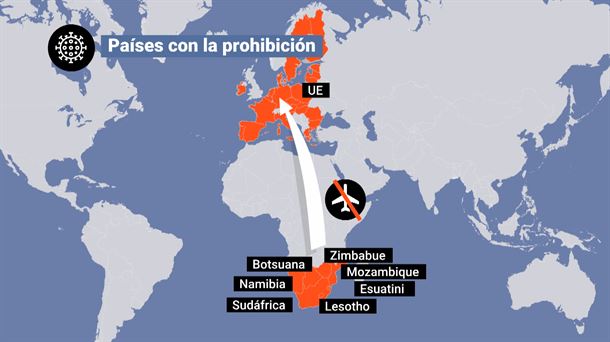The “omicron” variant has spread rapidly through South Africa, and cases have already been detected outside the African continent. Many countries have already announced that they are suspending air connections with southern Africa.
1:32


The countries of the European Union have agreed this Friday suspend travel from southern Africa due to the new South African variant of covid-19.
In addition, they have agreed that European residents who come from that area and who do have the right to enter the EU undergo testing and a quarantine period, as reported by the Slovenian presidency of the EU.
For its part, the Government of USA it will wait for more data before deciding whether to suspend air traffic with South Africa and other African countries.
The Spanish government It has already announced that it will restrict flights from South Africa and Botswana to isolate itself from the new variant of covid-19 that is unleashing great international concern, despite the few infections that have been identified so far, none of them in Spain. .
The Minister of Health, Carolina Darias, explained that there are still four days for this proposal to be approved, but “with imminent character” the General Directorate of Public Health will require passengers from high-risk countries “an antigen test or a PCR “, in addition to the vaccination, to be able to enter.
France, Italy, the United Kingdom, Germany, the Netherlands, Singapore, Austria and Israel are others who have already chosen to suspend travel.
And in the case of French stateFor example, the suspension will apply immediately for 48 hours and will also affect Lesotho, Zimbabwe, Mozambique, Namibia and Eswatini (formerly Swaziland), as well as South Africa and Botswana.
The EMA still cannot foresee if it will be necessary to adapt vaccines
For its part, the European Medicines Agency (EMA) considers it “premature” to foresee whether it will be necessary to adapt covid-19 vaccines “with a different composition” to face the new emerging variant of coronavirus, and has stressed that the current information on the functioning of this strain is “insufficient”.
“If it were shown that a new mutated variant evades immunity and spreads rapidly in places where the delta variant (now) predominates, it would be relevant to initiate activities related to the updating of vaccines,” the European agency has admitted.


High transmissibility
The European Center for Disease Prevention and Control (ECDC) has classified the new strain of SARS-CoV-2, known as ‘Nu’ and first identified in South Africa, as a “variant of interest”.
In addition, this European body has warned that “based on the available evidence, it is likely that this variant is associated with a very high transmissibility and a significant immunological escape”.
Cases
According to the ECDC report, the variant has so far been detected in Botswana (6 cases), South Africa (59) and Hong Kong (2), although Belgium has also detected one case. The first reported case in Hong Kong has a travel history to South Africa. In addition, Hong Kong has reported a second case related to the first.
Israel has also reported an identified case in a person traveling from Malawi. All sequenced cases reported by South Africa come from the Gauteng region, where Johannesburg is located, which is currently experiencing a rapid increase in COVID-19 cases.
The WHO determines that the new variant is risky and baptizes it as “omicrón”
The group of experts from the World Health Organization (WHO) meeting today to analyze the impact of the new variant of the coronavirus detected in South Africa has determined that it is a “risk variant”, possibly more contagious, and has christened it with the Greek letter omicrón.
The WHO acknowledges that some of the new mutations of the omicron variant seem to suggest an even greater transmission capacity than previous strains, with cases detected “in almost all South African provinces.”
“The variant has been detected at a faster rate than in previous surges in the number of infections, which could indicate that it has an advantage when it comes to spreading,” WHO experts have underlined in a statement.
They have not indicated for now if the new variant is more or less resistant to anticovid vaccines, but they did point out that diagnostic tests of the disease with PCR seem to continue to be valid to detect it.
South Africa confirmed on Thursday the detection of a new variant of the coronavirus, identified as B.1.1.529, which has multiple mutations and which has aroused “concern” among specialists because it could make current vaccines less effective, although its impact has yet to be be studied.
“We don’t know much about the variant yet, we know that has a high number of mutations, and the concern is that this affects the behavior of the virus, “said the expert, in the sense that can increase its transmission capacity, or its resistance to treatments, diagnostics and vaccines.
“It will take a few days to see what impact it can have and the potential of vaccines against the variant,” said the American expert, who saw the discovery somewhat positive, since in her opinion it reflects that laboratories continue to effectively control variations in the coronavirus.
The WHO has warned for months that an excessively slow rate of vaccination, something that still occurs in developing countries, can lead to new, more dangerous variants of the coronavirus, and thus delay the end of the pandemic.
Uncertainty in the bags
The uncertainty has been reflected in the stock markets, which have suffered sharp falls. Specifically, the Spanish has fallen by 3.86%, above the 3.21% decrease in Paris, 2.93% for Milan or 2.58% for London.
Kingston is an accomplished author and journalist, known for his in-depth and engaging writing on sports. He currently works as a writer at 247 News Agency, where he has established himself as a respected voice in the sports industry.











